英语泛读教程_4-Unit_2_Exploration
大学英语泛读教程第四册全文翻译
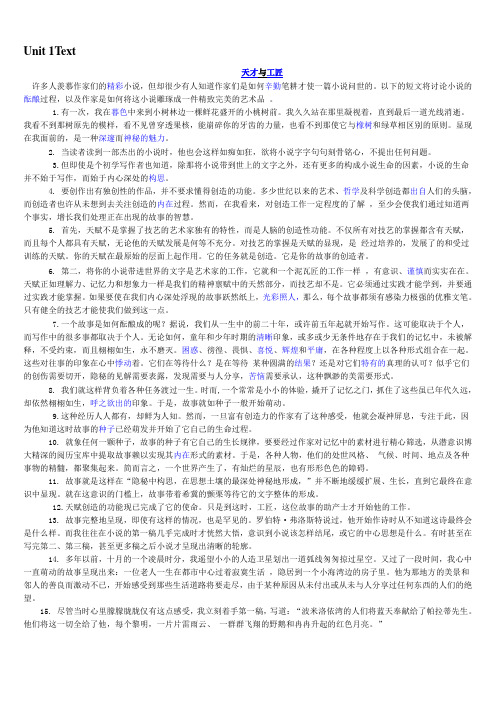
Unit 1Text天才与工匠许多人羡慕作家们的精彩小说,但却很少有人知道作家们是如何辛勤笔耕才使一篇小说问世的。
以下的短文将讨论小说的酝酿过程,以及作家是如何将这小说雕琢成一件精致完美的艺术品。
1.有一次,我在暮色中来到小树林边一棵鲜花盛开的小桃树前。
我久久站在那里凝视着,直到最后一道光线消逝。
我看不到那树原先的模样,看不见曾穿透果核,能崩碎你的牙齿的力量,也看不到那使它与橡树和绿草相区别的原则。
显现在我面前的,是一种深邃而神秘的魅力。
2. 当读者读到一部杰出的小说时,他也会这样如痴如狂,欲将小说字字句句刻骨铭心,不提出任何问题。
3.但即使是个初学写作者也知道,除那将小说带到世上的文字之外,还有更多的构成小说生命的因素,小说的生命并不始于写作,而始于内心深处的构思。
4. 要创作出有独创性的作品,并不要求懂得创造的功能。
多少世纪以来的艺术、哲学及科学创造都出自人们的头脑,而创造者也许从未想到去关注创造的内在过程。
然而,在我看来,对创造工作一定程度的了解,至少会使我们通过知道两个事实,增长我们处理正在出现的故事的智慧。
5. 首先,天赋不是掌握了技艺的艺术家独有的特性,而是人脑的创造性功能。
不仅所有对技艺的掌握都含有天赋,而且每个人都具有天赋,无论他的天赋发展是何等不充分。
对技艺的掌握是天赋的显现,是经过培养的,发展了的和受过训练的天赋。
你的天赋在最原始的层面上起作用。
它的任务就是创造。
它是你的故事的创造者。
6. 第二,将你的小说带进世界的文字是艺术家的工作,它就和一个泥瓦匠的工作一样,有意识、谨慎而实实在在。
天赋正如理解力、记忆力和想象力一样是我们的精神禀赋中的天然部分,而技艺却不是。
它必须通过实践才能学到,并要通过实践才能掌握。
如果要使在我们内心深处浮现的故事跃然纸上,光彩照人,那么,每个故事都须有感染力极强的优雅文笔。
只有健全的技艺才能使我们做到这一点。
7.一个故事是如何酝酿成的呢?据说,我们从一生中的前二十年,或许前五年起就开始写作。
英语泛读教程4unit-2-Three-Days-to-See课文和译文
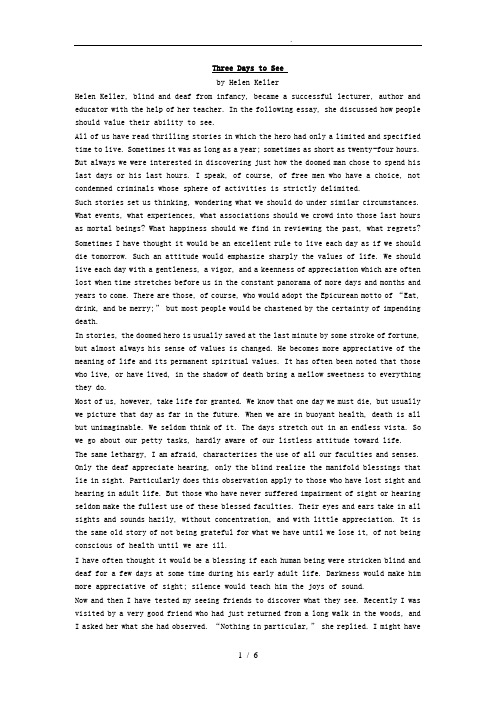
Three Days to Seeby Helen KellerHelen Keller, blind and deaf from infancy, became a successful lecturer, author and educator with the help of her teacher. In the following essay, she discussed how people should value their ability to see.All of us have read thrilling stories in which the hero had only a limited and specified time to live. Sometimes it was as long as a year; sometimes as short as twenty-four hours. But always we were interested in discovering just how the doomed man chose to spend his last days or his last hours. I speak, of course, of free men who have a choice, not condemned criminals whose sphere of activities is strictly delimited.Such stories set us thinking, wondering what we should do under similar circumstances. What events, what experiences, what associations should we crowd into those last hours as mortal beings? What happiness should we find in reviewing the past, what regrets? Sometimes I have thought it would be an excellent rule to live each day as if we should die tomorrow. Such an attitude would emphasize sharply the values of life. We should live each day with a gentleness, a vigor, and a keenness of appreciation which are often lost when time stretches before us in the constant panorama of more days and months and yea rs to come. There are those, of course, who would adopt the Epicurean motto of “Eat, drink, and be merry;” but most people would be chastened by the certainty of impending death.In stories, the doomed hero is usually saved at the last minute by some stroke of fortune, but almost always his sense of values is changed. He becomes more appreciative of the meaning of life and its permanent spiritual values. It has often been noted that those who live, or have lived, in the shadow of death bring a mellow sweetness to everything they do.Most of us, however, take life for granted. We know that one day we must die, but usually we picture that day as far in the future. When we are in buoyant health, death is all but unimaginable. We seldom think of it. The days stretch out in an endless vista. So we go about our petty tasks, hardly aware of our listless attitude toward life.The same lethargy, I am afraid, characterizes the use of all our faculties and senses. Only the deaf appreciate hearing, only the blind realize the manifold blessings that lie in sight. Particularly does this observation apply to those who have lost sight and hearing in adult life. But those who have never suffered impairment of sight or hearing seldom make the fullest use of these blessed faculties. Their eyes and ears take in all sights and sounds hazily, without concentration, and with little appreciation. It is the same old story of not being grateful for what we have until we lose it, of not being conscious of health until we are ill.I have often thought it would be a blessing if each human being were stricken blind and deaf for a few days at some time during his early adult life. Darkness would make him more appreciative of sight; silence would teach him the joys of sound.Now and then I have tested my seeing friends to discover what they see. Recently I was visited by a very good friend who had just returned from a long walk in the woods, and I asked her what she had observed. “Nothing in particular,” she replied. I might havebeen incredulous had I not been accustomed to such responses, for long ago I became convinced that the seeing see little.How was it possible, I asked myself, to walk for an hour through the woods and see nothing worthy of note? I who cannot see find hundreds of things to interest me through mere touch. I feel the delicate symmetry of a leaf. I pass my hands lovingly about the smooth skin of a silver birch, or the rough shaggy bark of a pine. In spring I touch the branches of trees hopefully in search of a bud, the first sign of awakening Nature after her winter's sleep. I feel the delightful, velvety texture of a flower, and discover its remarkable convolutions; and something of the miracle of Nature is revealed to me. Occasionally, if I am very fortunate, I place my hand gently on a small tree and feel the happy quiver of a bird in full song. I am delighted to have the cool water of a brook rush through my open fingers. To me a lush carpet of pine needles or spongy grass is more welcome than the most luxurious Persian rug. To me the pageant of seasons is a thrilling and unending drama, the action of which streams through my finger tips. At times my heart cries out with longing to see all these things. If I can get so much pleasure from mere touch, how much more beauty must be revealed by sight. Yet, those who have eyes apparently see little. The panorama of colour and action which fills the world is taken for granted. It is human, perhaps, to appreciate little that which we have and to long for that which we have not, but it is a great pity that in the world of light the gift of sight is used only as a mere convenience rather than as a means of adding fullness to life.If I were the president of a university I should establish a compulsory course in “How to Use Your Eyes”. The professor would try to show his pupils how they could add joy to their lives by really seeing what passes unnoticed before them. He would try to awake their dormant and sluggish faculties.Suppose you set your mind to work on the problem of how you would use your own eyes if you had only three more days to see. If with the oncoming darkness of the third night you knew that the sun would never rise for you again, how would you spend those three precious intervening days? What would you most want to let your gaze rest upon?I, naturally, should want most to see the things which have become dear to me through my years of darkness. You, too, would want to let your eyes rest long on the things that have become dear to you so that you could take the memory of them with you into the night that loomed before you.I should want to see the people whose kindness and gentleness and companionship have made my life worth living. First I should like to gaze long upon the face of my dear teacher, Mrs. Anne Sullivan Macy, who came to me when I was a child and opened the outer world to me. I should want not merely to see the outline of her face, so that I could cherish it in my memory, but to study that face and find in it the living evidence of the sympathetic tenderness and patience with which she accomplished the difficult tasks of my education. I should like to see in her eyes that strength of character which has enabled her to stand firm in the face of difficulties, and that compassion for all humanity which she has revealed to me so often.I do not know what it is to see into the heart of a friend through that “window of the soul”, the eye. I can only “see” through my finger tips the outline of a face. I can detect laughter, sorrow, and many other obvious emotions. I know my friends from the feel of their faces. But I cannot really picture their personalities by touch. I know their personalities, of course, through other means, through the thoughts they express to me, through whatever of their actions are revealed to me. But I am denied that deeper understanding of them which I am sure would come through sight of them through watching their reactions to various expressed thoughts and circumstances, through noting the immediate and fleeting reactions of their eyes and countenance.Friends who are near to me I know well, because through the months and years they reveal themselves to me in all their phases; but of causal friends I have only an incomplete impression, an impression gained from a handclasp, from spoken words which I take from their lips with my finger tips, or which they tap into the palm of my hand.How much easier, how much more satisfying it is for you who can see to grasp quickly the essential qualities of another person by watching the subtleties of expression, the quiver of a muscle, the flutter of a hand. But does it ever occur to you to use your sight to see into the inner nature of a friend or acquaintance? Do not most of you seeing people grasp casually the outward features of a face and let it go at that?For instance, can you describe accurately the faces of five good friends? Some of you can, but many cannot. As an experiment, I have questioned husbands of long standing about the color of their wives' eyes, and often they express embarrassed confusion and admit that they do not know. And, incidentally, it is a chronic complaint of wives that their husbands do not notice new dresses, new hats, and changes in household arrangements. The eyes of seeing persons soon become accustomed to the routine of their surroundings, and they actually see only the startling and spectacular. But even in viewing the most spectacular sights the eyes are lazy. Court records reveal every day how inaccurately “eyewitnesses” see. A given event will be “seen” in several different ways by as many witnesses. Some see more than others, but few see everything that is within the range of their vision.Oh, the things that I should see if I had the power of sight for just three days!(1634 words)译文假如我有三天光明海伦·凯勒海伦·凯勒自幼就又盲又聋,在老师的帮助下成为一名成功的讲师、作家与教育家。
英语泛读教程4unit2ThreeDaystoSee课文和译文

英语泛读教程4unit2ThreeDaystoSee课文和译文第一篇:英语泛读教程4unit 2 Three Days to See课文和译文Three Days to Seeby Helen KellerHelen Keller, blind and deaf from infancy, became a successful lecturer, author and educator with the help of her teacher.In the following essay, she discussed how people should value their ability to see.All of us have read thrilling stories in which the hero had only a limited and specified time to live.Sometimes it was as long as a year;sometimes as short as twenty-four hours.But always we were interested in discovering just how the doomed man chose to spend his last days or his last hours.I speak, of course, of free men who have a choice, not condemned criminals whose sphere of activities is strictly delimited.Such stories set us thinking, wondering what we should do under similar circumstances.What events, what experiences, what associations should we crowd into those last hours as mortal beings? What happiness should we find in reviewing the past, what regrets?Sometimes I have thought it would be an excellent rule to live each day as if we should die tomorrow.Such an attitude would emphasize sharply the values of life.We should live each day with a gentleness, a vigor, and a keenness of appreciation which are often lost when time stretches before us in the constant panorama of more days and months and years to come.There are those, of course, who would adopt the Epicurean motto of “Eat, drink, and be merry;” but most people would be chastened by the certainty of impending death.In stories, the doomed hero is usually saved at the last minute by some stroke of fortune, but almost always his sense of values is changed.Hebecomes more appreciative of the meaning of life and its permanent spiritual values.It has often been noted that those who live, or have lived, in the shadow of death bring a mellow sweetness to everything they do.Most of us, however, take life for granted.We know that one day we must die, but usually we picture that day as far in the future.When we are in buoyant health, death is all but unimaginable.We seldom think of it.The days stretch out in an endless vista.So we go about our petty tasks, hardly aware of our listless attitude toward life.The same lethargy, I am afraid, characterizes the use of all our faculties and senses.Only the deaf appreciate hearing, only the blind realize the manifold blessings that lie in sight.Particularly does this observation apply to those who have lost sight and hearing in adult life.But those who have never suffered impairment of sight or hearing seldom make the fullest use of these blessed faculties.Their eyes and ears take in all sights and sounds hazily, without concentration, and with little appreciation.It is the same old story of not being grateful for what we have until we lose it, of not being conscious of health until we are ill.I have often thought it would be a blessing if each human being were stricken blind and deaf for a few days at some time during his early adult life.Darkness would make him more appreciative of sight;silence would teach him the joys of sound.Now and then I have tested my seeing friends to discover what they see.Recently I was visited by a very good friend who had just returned from a long walk in the woods, and I asked her what she had observed.“Nothing in particular,” she replied.I might havebeen incredulous had I not been accustomed to such responses, for long ago I became convinced that the seeing see little.How was it possible, I asked myself, to walk for an hourthrough the woods and see nothing worthy of note? I who cannot see find hundreds of things to interest me through mere touch.I feel the delicate symmetry of a leaf.I pass my hands lovingly about the smooth skin of a silver birch, or the rough shaggy bark of a pine.In spring I touch the branches of trees hopefully in search of a bud, the first sign of awakening Nature after her winter's sleep.I feel the delightful, velvety texture of a flower, and discover its remarkable convolutions;and something of the miracle of Nature is revealed to me.Occasionally, if I am very fortunate, I place my hand gently on a small tree and feel the happy quiver of a bird in full song.I am delighted to have the cool water of a brook rush through my open fingers.To me a lush carpet of pine needles or spongy grass is more welcome than the most luxurious Persian rug.To me the pageant of seasons is a thrilling and unending drama, the action of which streams through my finger tips.At times my heart cries out with longing to see all these things.If I can get so much pleasure from mere touch, how much more beauty must be revealed by sight.Yet, those who have eyes apparently see little.The panorama of colour and action which fills the world is taken for granted.It is human, perhaps, to appreciate little that which we have and to long for that which we have not, but it is a great pity that in the world of light the gift of sight is used only as a mere convenience rather than as a means of adding fullness to life.If I were the president of a university I should establish a compulsory course in “How to Use Your Eyes”.The professor would try to show his pupils how they could add joy to their lives by really seeing what passes unnoticed before them.He would try to awake their dormant and sluggish faculties.Suppose you set your mind to work on the problem of how you would use your own eyes if you had onlythree more days to see.If with the oncoming darkness of the third night you knew that the sun would never rise for you again, how would you spend those three precious intervening days? What would you most want to let your gaze rest upon?I, naturally, should want most to see the things which have become dear to me through my years of darkness.You, too, would want to let your eyes rest long on the things that have become dear to you so that you could take the memory of them with you into the night that loomed before you.I should want to see the people whose kindness and gentleness and companionship have made my life worth living.First I should like to gaze long upon the face of my dear teacher, Mrs.Anne Sullivan Macy, who came to me when I was a child and opened the outer world to me.I should want not merely to see the outline of her face, so that I could cherish it in my memory, but to study that face and find in it the living evidence of the sympathetic tenderness and patience with which she accomplished the difficult tasks of my education.I should like to see in her eyes that strength of character which has enabled her to stand firm in the face of difficulties, and that compassion for all humanity which she has revealed to me so often.I do not know what it is to see into the heart of a friend through that “window of the soul”, the eye.I can only “see” through my finger tips the outline of a face.I can detect laughter, sorrow, and many other obvious emotions.I know my friends from the feel of their faces.But I cannot really picture their personalities by touch.I know their personalities, of course, through other means, through the thoughts they express to me, through whatever of their actions are revealed to me.But I am denied that deeper understanding of them which I am sure would come through sight of them throughwatching their reactions to various expressed thoughts and circumstances, through noting the immediate and fleeting reactions of their eyes and countenance.Friends who are near to me I know well, because through the months and years they reveal themselves to me in all their phases;but of causal friends I have only an incomplete impression, an impression gained from a handclasp, from spoken words which I take from their lips with my finger tips, or which they tap into the palm of my hand.How much easier, how much more satisfying it is for you who can see to grasp quickly the essential qualities of another person by watching the subtleties of expression, the quiver of a muscle, the flutter of a hand.But does it ever occur to you to use your sight to see into the inner nature of a friend or acquaintance? Do not most of you seeing people grasp casually the outward features of a face and let it go at that?For instance, can you describe accurately the faces of five good friends? Some of you can, but many cannot.As an experiment, I have questioned husbands of long standing about the color of their wives' eyes, and often they express embarrassed confusion and admit that they do not know.And, incidentally, it is a chronic complaint of wives that their husbands do not notice new dresses, new hats, and changes in household arrangements.The eyes of seeing persons soon become accustomed to the routine of their surroundings, and they actually see only the startling and spectacular.But even in viewing the most spectacular sights the eyes are lazy.Court records reveal every day how inaccurately “eyewitnesses” see.A given event will be “seen” in several different ways by as many witnesses.Some see more than others, but few see everything that is within the range of their vision.Oh, the things that I shouldsee if I had the power of sight for just three days!(1634 words)译文假如我有三天光明海伦·凯勒海伦·凯勒自幼就又盲又聋,在老师的帮助下成为一名成功的讲师、作家及教育家。
4《泛读教程》黄灏doc
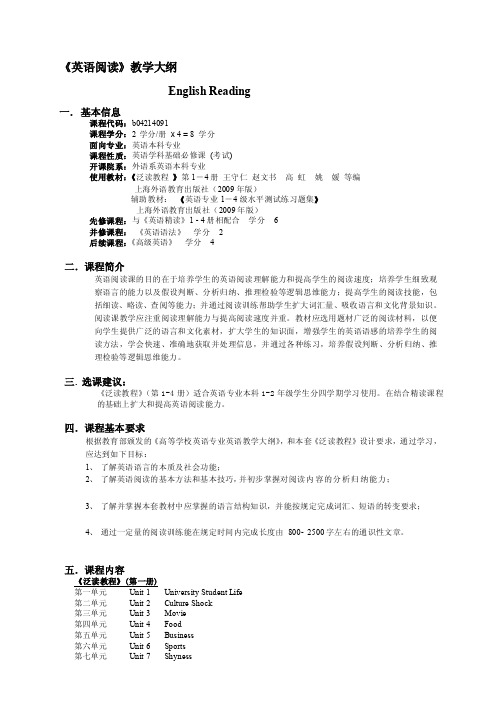
《英语阅读》教学大纲English Reading一.基本信息课程代码:b04214091课程学分:2 学分/册x 4 = 8 学分面向专业:英语本科专业课程性质:英语学科基础必修课(考试)开课院系:外语系英语本科专业使用教材:《泛读教程》第1-4册王守仁赵文书高虹姚媛等编上海外语教育出版社(2009年版)辅助教材:《英语专业1-4级水平测试练习题集》上海外语教育出版社(2009年版)先修课程:与《英语精读》1 - 4册相配合学分6并修课程:《英语语法》学分2后续课程:《高级英语》学分4二.课程简介英语阅读课的目的在于培养学生的英语阅读理解能力和提高学生的阅读速度;培养学生细致观察语言的能力以及假设判断、分析归纳、推理检验等逻辑思维能力;提高学生的阅读技能,包括细读、略读、查阅等能力;并通过阅读训练帮助学生扩大词汇量、吸收语言和文化背景知识。
阅读课教学应注重阅读理解能力与提高阅读速度并重。
教材应选用题材广泛的阅读材料,以便向学生提供广泛的语言和文化素材,扩大学生的知识面,增强学生的英语语感的培养学生的阅读方法,学会快速、准确地获取并处理信息,并通过各种练习,培养假设判断、分析归纳、推理检验等逻辑思维能力。
三. 选课建议:《泛读教程》(第1-4册)适合英语专业本科1-2年级学生分四学期学习使用。
在结合精读课程的基础上扩大和提高英语阅读能力。
四.课程基本要求根据教育部颁发的《高等学校英语专业英语教学大纲》,和本套《泛读教程》设计要求,通过学习,应达到如下目标:1、了解英语语言的本质及社会功能;2、了解英语阅读的基本方法和基本技巧,并初步掌握对阅读内容的分析归纳能力;3、了解并掌握本套教材中应掌握的语言结构知识,并能按规定完成词汇、短语的转变要求;4、通过一定量的阅读训练能在规定时间内完成长度由800- 2500字左右的通识性文章。
五.课程内容《泛读教程》(第一册)第一单元Unit 1 University Student Life第二单元Unit 2 Culture Shock第三单元Unit 3 Movie第四单元Unit 4 Food第五单元Unit 5 Business第六单元Unit 6 Sports第七单元Unit 7 Shyness第八单元Unit 8 Native People第九单元Unit 9 Bible Stories第十单元Unit 10 Festivals and Holidays第十一单元Unit 11 Advertising第十二单元Unit 12 Agriculture《泛读教程》(第二册)第一单元Unit 1 Reading第二单元Unit 2 Music第三单元Unit 3 Generation第四单元Unit 4 Weather and Climate第五单元Unit 5 Work第六单元Unit 6 The African A merican第七单元Unit 7 Greek Stories第八单元Unit 8 Attitude Towards Life第九单元Unit 9 First Aid第十单元Unit 10 Marriage第十一单元Unit 11 Creativity第十二单元Unit 12 Travel《泛读教程》(第三册)第一单元 Unit 1 Reading Strategies第二单元 Unit 2 Education第三单元 Unit 3 Body language第四单元 Unit 4 Animals第五单元 Unit 5 History第六单元 Unit 6 Language第七单元 Unit 7 Space第八单元 Unit 8 Women第九单元 Unit 9 Cities第十单元 Unit 10 Cross-cultural Communication 第十一单元 Unit 11 Information Retrieval第十二单元 Unit 12 Environment《泛读教程》(第四册)第一单元Unit 1 Language Testing第二单元Unit 2 Exploration第三单元Unit 3 Refugee第四单元Unit 4 Cigarettes第五单元Unit 5 Globalization第六单元Unit 6 Immigrants第七单元Unit 7 Ecology第八单元Unit 8 Holocaust第九单元Unit 9 Diplomatic Practice第十单元Unit 10 Christianity第十一单元Unit 11 Politics第十二单元Unit 12 Art六.课内实验名称及基本要求(略)七.教学进度(第1 - 4册基本进度如下 , 可作适当调整)第一单元 2 课时/周第二单元 2 课时/周第三单元 2 课时/周第四单元 2 课时/周第五单元 2 课时/周第六单元 2 课时/周第七单元 2 课时/周第八单元 2 课时/周第九单元 2 课时/周第十单元 2 课时/周第十一单元 2 课时/周第十二单元 2 课时/周八.作业按照教材每章节作业分为两个部分;1.课前预习课堂必须要求全部完成的部分。
英语泛读(4)教案-推荐下载

授课方式 讲授、练习 授课学时 6
教学目标或要求:
对全部高中资料试卷电气设备,在安装过程中以及安装结束后进行高中资料试卷调整试验;通电检查所有设备高中资料电试力卷保相护互装作置用调与试相技互术通关,1系电过,力管根保线据护敷生高设产中技工资术0艺料不高试仅中卷可资配以料置解试技决卷术吊要是顶求指层,机配对组置电在不气进规设行范备继高进电中行保资空护料载高试与中卷带资问负料题荷试22下卷,高总而中体且资配可料置保试时障卷,各调需类控要管试在路验最习;大题对限到设度位备内。进来在行确管调保路整机敷使组设其高过在中程正资1常料中工试,况卷要下安加与全强过,看2度并22工且22作尽22下可22都能2可地护1以缩关正小于常故管工障路作高高;中中对资资于料料继试试电卷卷保破连护坏接进范管行围口整,处核或理对者高定对中值某资,些料审异试核常卷与高弯校中扁对资度图料固纸试定,卷盒编工位写况置复进.杂行保设自护备动层与处防装理腐置,跨高尤接中其地资要线料避弯试免曲卷错半调误径试高标方中高案资等,料,编5试要写、卷求重电保技要气护术设设装交备备4置底高调、动。中试电作管资高气,线料中课并3敷试资件且、设卷料中拒管技试试调绝路术验卷试动敷中方技作设包案术,技含以来术线及避槽系免、统不管启必架动要等方高多案中项;资方对料式整试,套卷为启突解动然决过停高程机中中。语高因文中此电资,气料电课试力件卷高中电中管气资壁设料薄备试、进卷接行保口调护不试装严工置等作调问并试题且技,进术合行,理过要利关求用运电管行力线高保敷中护设资装技料置术试做。卷到线技准缆术确敷指灵设导活原。。则对对:于于在调差分试动线过保盒程护处中装,高置当中高不资中同料资电试料压卷试回技卷路术调交问试叉题技时,术,作是应为指采调发用试电金人机属员一隔,变板需压进要器行在组隔事在开前发处掌生理握内;图部同纸故一资障线料时槽、,内设需,备要强制进电造行回厂外路家部须出电同具源时高高切中中断资资习料料题试试电卷卷源试切,验除线报从缆告而敷与采设相用完关高毕技中,术资要资料进料试行,卷检并主查且要和了保检解护测现装处场置理设。备高中资料试卷布置情况与有关高中资料试卷电气系统接线等情况,然后根据规范与规程规定,制定设备调试高中资料试卷方案。
大学英语泛读教程第四册全文翻译
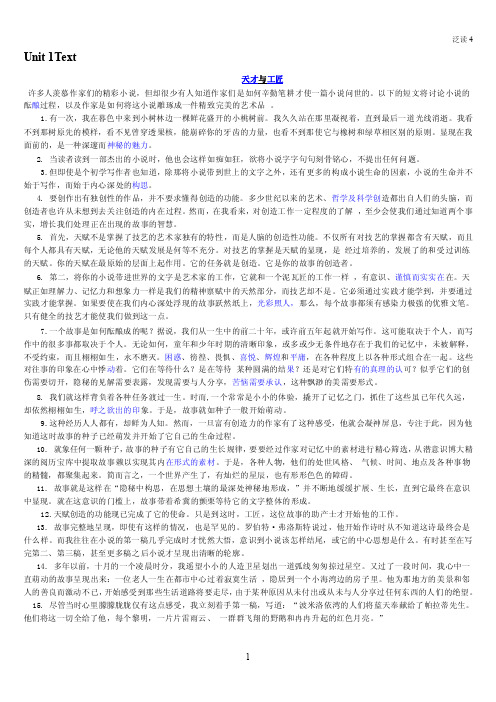
Unit 1Text天才与工匠许多人羡慕作家们的精彩小说,但却很少有人知道作家们是如何辛勤笔耕才使一篇小说问世的。
以下的短文将讨论小说的酝酿过程,以及作家是如何将这小说雕琢成一件精致完美的艺术品。
1.有一次,我在暮色中来到小树林边一棵鲜花盛开的小桃树前。
我久久站在那里凝视着,直到最后一道光线消逝。
我看不到那树原先的模样,看不见曾穿透果核,能崩碎你的牙齿的力量,也看不到那使它与橡树和绿草相区别的原则。
显现在我面前的,是一种深邃而神秘的魅力。
2. 当读者读到一部杰出的小说时,他也会这样如痴如狂,欲将小说字字句句刻骨铭心,不提出任何问题。
3.但即使是个初学写作者也知道,除那将小说带到世上的文字之外,还有更多的构成小说生命的因素,小说的生命并不始于写作,而始于内心深处的构思。
4. 要创作出有独创性的作品,并不要求懂得创造的功能。
多少世纪以来的艺术、哲学及科学创造都出自人们的头脑,而创造者也许从未想到去关注创造的内在过程。
然而,在我看来,对创造工作一定程度的了解,至少会使我们通过知道两个事实,增长我们处理正在出现的故事的智慧。
5. 首先,天赋不是掌握了技艺的艺术家独有的特性,而是人脑的创造性功能。
不仅所有对技艺的掌握都含有天赋,而且每个人都具有天赋,无论他的天赋发展是何等不充分。
对技艺的掌握是天赋的显现,是经过培养的,发展了的和受过训练的天赋。
你的天赋在最原始的层面上起作用。
它的任务就是创造。
它是你的故事的创造者。
6. 第二,将你的小说带进世界的文字是艺术家的工作,它就和一个泥瓦匠的工作一样,有意识、谨慎而实实在在。
天赋正如理解力、记忆力和想象力一样是我们的精神禀赋中的天然部分,而技艺却不是。
它必须通过实践才能学到,并要通过实践才能掌握。
如果要使在我们内心深处浮现的故事跃然纸上,光彩照人,那么,每个故事都须有感染力极强的优雅文笔。
高教版大学英语泛读教程4(第三版)电子教案Unit 2
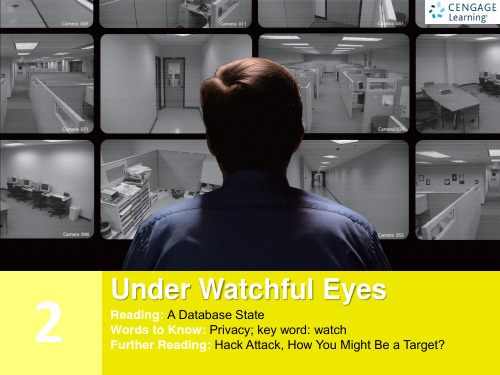
A Do You Get It?
Multiple Matching
Scan each of the five paragraphs (a-e) again. Below are a series of newspaper headlines that refer to ideas or information contained in each paragraph. Match the headline to the paragraph.
Before You Start
• Do citizens have to carry identification in your country? If yes, why? If no, what will happen?
• Is identity theft or the misuse of personal data a concern? Have you ever experienced or heard any stories related to it? What are they?
__e___ 1. Victory for the people as government ends Big Brother laws __c___ 2. NIR data to include eye scans __a___ 3. Author’s vision of the future was accurate __d___ 4. Prime Minister says measures will prevent terror __d___ 5. Critics say ID cards just more paperwork __a___ 6. Figures show most cameras do not belong to government __e___ 7. Victory for database opponents __b___ 8. ID bill passed
英语泛读教程4教案
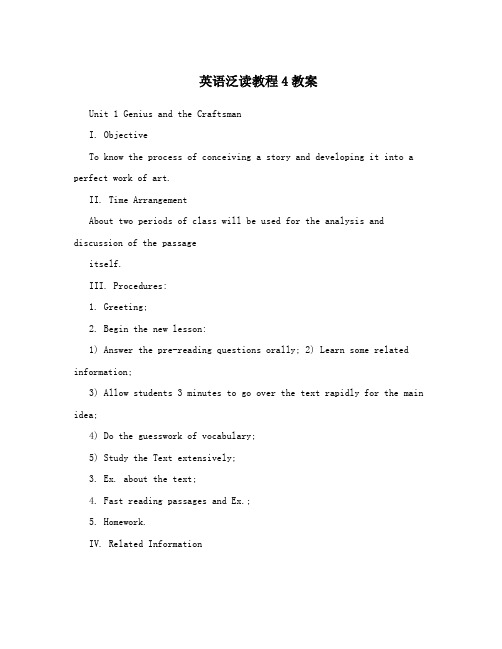
英语泛读教程4教案Unit 1 Genius and the CraftsmanI. ObjectiveTo know the process of conceiving a story and developing it into a perfect work of art.II. Time ArrangementAbout two periods of class will be used for the analysis and discussion of the passageitself.III. Procedures:1. Greeting;2. Begin the new lesson:1) Answer the pre-reading questions orally; 2) Learn some related information;3) Allow students 3 minutes to go over the text rapidly for the main idea;4) Do the guesswork of vocabulary;5) Study the Text extensively;3. Ex. about the text;4. Fast reading passages and Ex.;5. Homework.IV. Related InformationMany people admire writers for their exquisite stories, but few of them know withwhat painstaking efforts writers work to bring a story into the word. The followingpassage discusses the process of writing a story in terms of genius and craftsman.Preview Questions(1) What do you think the meaning of ―genius‖ is?(2) What does a person do to be a genius?(3) Where does genius come from?(4) What do you think the meaning of ―craftsman‖ is?(5) What does a person do to be a craftsman?(6) What relation do you think it is between ―genius‖ and―craftsman‖?V. Emphasized PointsKey Words(1) genius(2) craftsman and craftsmanship(3) the creative function(4) conception in the dark of the mind(5) the lucid impression(6) a process of intelligent selection(7) to trust and write(8) rewriting1VI. Text Comprehension1. Structure AnalysisDivision Paragraph Main IdeaThe firstPart I three An introduction to the topic.paragraphs(1) The necessity of understanding the creative function; The restof Part II (2) the process of conceiving a story; (3) the process of passage developing a story into a perfect work of art.2. Comprehension Questions(1) Why does the writer think it necessary to the creative function?-- The writer believes that understanding of the creative function increases ourwisdom in dealing with the emerging story by making us aware of two things:genius and craftsman or craftsmanship.(2) How is a story conceived?-- A story is conceived when some experience of the present provokes thecombination of one‘s early impressions.(3) What is the principle of a story‘s life?-- Like any seed, the seed of a story has its own principle of growth: a) a processof intelligent selection, b) rarely presents itself as a whole.(4) What are the three functions of the craftsman?-- Trust, write, and generating skill.Topic for Discussion, Is it possible for a writer to start writing on impulse and then catch some good ideas flashing into his mind during the process of writing? Cite examples to illustrate your point., Do you think it is true a good story is not written but rewritten? Why or why not? 3. Teaching Points for Reference(1). So it is with the reader who comes upon an outstanding story: spellbound, he takes it to his heart, no question asked.(当读者读到一部杰出的小说时,他也会这样如痴如狂,欲将小说字字句句刻骨铭心,绝不会提出任何问题。
英语泛读教程4文章翻译及答案 完整版
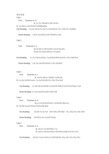
课文答案Unit 1Text: Exercises A. dB. 1.c 2.c 3.b 4.d 5.c 6.b 7.b 8.aD. 1.a 2.b 3.c 4.d 5.b 6.d 7.d 8.b9.a10.aFast Reading: 1.a 2.a 3.d 4.c 5.c 6.d 7.c 8.d 9.d 10.c 11.c 12.b 13.c 14.d15.aHome Reading: 1.d 2.c 3.a 4.d 5.c 6.d 7.b 8.b 9.c 10.aUnit 2Text: Exercises A. aB.1.b 2.b 3.c 4.b 5.d 6.b 7.a 8 .b 9.a 10.cD.1.b 2.a 3.a 4.a 5.b 6.a 7.c 8.d 9.cFast Reading: 1.a 2.c 3.d 4.a 5.b 6.c 7.a 8.d 9.d 10.b 11.d 12.c 13.c 14.d 15.bHome Reading: 1.d .2.a 3.d 4.d 5.b 6.d 7.c 8.c 9.d 10.dUnit 3Text: Exercises A. cB. 1.b 2.a 3.b 4.c 5.d 6.b 7.a 8.b 9.bD. 1.a 2.a 3.d 4.b 5.a 6.c 7.c 8.a 9.d 10.b 11.c 12.c 13.a 14.dFast Reading: 1.c 2.b 3.b 4.a 5.b 6.b 7.a 8.d 9.b 10.b 11.b 12.b 13.d 14.a 1 5.dHome Reading: 1.c 2.a 3.a 4.b 5.a 6.b 7.d 8.c 9.bUnit 4Text: Exercises A. bB.1.c 2.d 3.b 4.d 5.b 6.c 7.a 8.d 9.b 10.d 11.cD. 1.d 2.b 3.a 4.a 5.b 6.d 7.b 8.a 9.b 10.dFast Reading: 1.d 2.b 3.c 4.c 5.d 6.b 7.d 8.c 9.b 10.d 11.c 12.a 13.c 14.c 15.d Home Reading: 1.d 2.d 3.c 4.c 5.a 6.d 7.b 8.aUnit 5Text: Exercises A. aB. 1.b 2.c 3.a 4.d 5.b 6.c 7.aD. 1.d 2.c 3.d 4.a 5.b 6.a 7.b 8.d 9.a 10.d 11.b 12.c 13.aFast Reading: 1.b 2.c 3.a 4.c 5.d 6.a 7.c 8.b 9.d 10.c 11.a 12.c 13.c 14.c 15.cHome Reading: 1.c 2.b 3.a 4.d 5.a 6.d 7.b 8.c 9.c 10.aUnit 6Text: Exercises A. bB. 1.b 2.d 3.a 4.a 5.c 6.b 7.c 8.dD. 1.d 2.c 3.a 4.a 5.d 6.c 7.d 8.d 9.b 10.a 11.b 12.cFast Reading: 1.c 2.a 3.d 4.b 5.a 6.b 7.c 8.d 9.a 10.b 11.b 12.d 13.a 14.c 15.cHome Reading: 1.c 2.a 3.b 4.d 5.b 6.a 7.c 8.a 9.c 10.bUnit 7Text: Exercises A. cB. 1.c 2.a 3.a 4.b 5.d 6.a 7.b 8.cD. 1.a 2.d 3.c 4.d 5.a 6.a 7.b 8.b 9.c 10.d 11.a 12.b 13.cFast Reading: 1.a 2.d 3.c 4.b 5.a 6.d 7.b 8.d 9.c 10.b 11.d 12.b 13.b 14.c 15.dHome Reading: 1.d 2.d 3.b 4.d 5.c 6.a 7.b 8.a 9.b 10.cUnit 8Text: Exercises c.B. 1.d 2. c 3.b 4.b 5 a. 6. c 7.a 8.cD. 1. c2.d 3.a 4. c 5. a 6. b 7. d 8. c 9. b 10.b 11.d 12.d 13.d 14.c 15.dFast Reading: 1.a 2.c 3. a 4. a 5. d 6. b 7c . 8. d 9. d 10. c 11.d 12. d 13. d 14.c 15.d Home Reading: 1.a 2. d 3. d 4.d 5.b 6.c 7.d 8. bUnit 9Text: Exercises A. bB. 1.b 2.a 3.d 4.c 5.d 6.a 7.b 8.cD. 1.a 2.c 3.b 4.a 5.c 6.d 7.a 8.b 9.c 10.a 11.c 12.a 13.b 14.c 15.a 16.c17.d 18.b 19.aFast Reading: 1.a 2.ac3.c 4.d 5.b 6.a 7.b 8.c 9.c 10.d 11.c 12.b 13.c 14.a 15.dHome Reading: 1.b 2.c 3.d 4.a 5.c 6.b 7.d 8.a 9.d 10.dUnit 10Text: Exercises A. cB. 1.c 2.b 3.b 4.c 5.b 6.c 7.b 8.b 9.c 10.cD. 1.b 2.a 3.c 4.b 5.a 6.d 7.d 8.a 9.c 10.a 11.c 12.b 13.b 14.aFast Reading: 1.a 2.b 3.b 4.d 5.a 6.c 7.b 8.b 9.d 10.a 11.d 12.c 13.d 14.d 15.bHome Reading: 1.c2.c 3.c4.a 5.d 6.b 7.d 8.d 9.b 10.cUnit 11Text: Exercises A. bB. 1.b 2.a 3.a 4.c 5.d 6.c 7.b 8.cD. 1.d 2.a 3.a 4.d 5.b 6.c 7.b 8.a 9.c 10.aFast Reading: 1.c 2.a 3.b 4.d 5.d 6.a 7.c 8.c 9.d 10.a 11.c 12.c 13.d 14.d 15.bHome Reading: 1.c 2.a 3.c 4.a 5.d 6.b 7.a 8.b 9.a 10.cUnit 12Text: Excises A. bB. 1.d 2.a 3.b 4.d 5.d 6.b 7.c 8.d 9.cD. 1.b 2.a 3.a 4.b 5.b 6.c 7.a 8.b 9.c 10.b 11.b 12.a 13.c 14.b 15.aFast Reading: 1.d 2.d 3.b 4.b 5.b 6.d 7.d 8.c 9.b 10.c 11.c 12.b 13.c 14.d 15.aHome Reading: 1.d 2.c 3.c 4.b 5.d 6.b 7.cUnit 13Text: Exercises bB. 1.a 2.b3.b 4.d5.c 6.a 7. c 8.c 9.cD. 1.a 2.b 3.b 4.a 5.b 6.d 7.a 8.c 9. c10.c 11. d 12. b 13.d 14.aFast Reading: 1.d 2.a 3.d 4.d5.d 6.c 7.b 8.c 9.a 10.a 11.c 12.b 13.b 14.d 15.dHome Reading: 1.b 2.c 3.d 4.c 5.c 6.b 7.cd 8.a d.a 10.b 11.dUnit 14Text: Exercises cB. 1c. 2.d 3.b 4.b 5.d 6.d 7.c 8.d 9.d 10.dD. 1.c. 2.d 3.b 4.a 5. d 6.d 7.a 8. a 9.b 10.a 11.c 12.a 13.a 14.d Fast Reading: 1.a 2.c 3.b 4. a 5.d 6.d 7. d 8.b 9.c 10. c 11.d 12.b 13.c 14. d15.bHome Reading: 1. c2. c 3. c 4. a 5.a 6. c 7.c 8.dUnit 15Text: Exercises A. bB. 1.a 2.d 3.c 4.c 5.a 6.c 7.d 8.b 9.bD. 1.a 2.b 3.c 4.c 5.a 6.b 7.a 8.a 9.d 10.bFast Reading: 1.a 2.c 3.d 4.b 5.a 6.b 7.c 8.c 9.d 10.c 11.c 12.b 13.a 14.d 15.dHome Reading: 1.a 2.c 3.d 4.b 5.c 6.d 7.d 8.b 9.课后翻译Unit 1Text天才与工匠许多人羡慕作家们的精彩小说,但却很少有人知道作家们是如何辛勤笔耕才使一篇小说问世的。
大学英语泛读教程练习答案
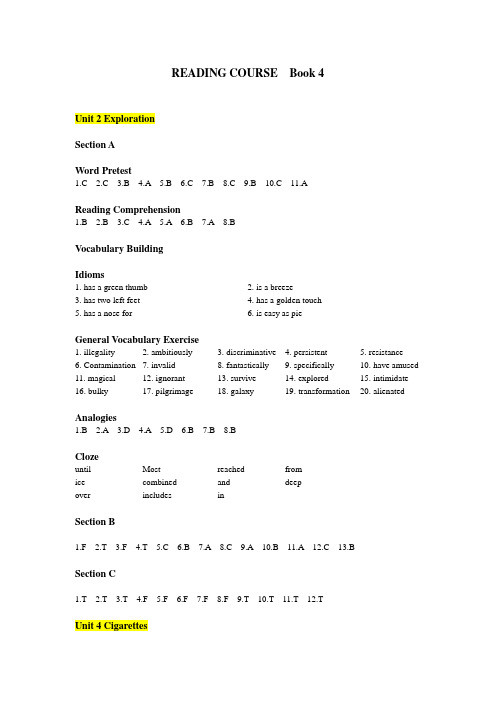
READING COURSE Book 4Unit 2 ExplorationSection AWord Pretest1.C2.C3.B4.A5.B6.C7.B8.C9.B 10.C 11.AReading Comprehension1.B2.B3.C4.A5.A6.B7.A8.BVocabulary BuildingIdioms1. has a green thumb2. is a breeze3. has two left feet4. has a golden touch5. has a nose for6. is easy as pieGeneral Vocabulary Exercise1. illegality2. ambitiously3. discriminative4. persistent5. resistance6. Contamination7. invalid8. fantastically9. specifically 10. have amused 11. magical 12. ignorant 13. survive 14. explored 15. intimidate 16. bulky 17. pilgrimage 18. galaxy 19. transformation 20. alienatedAnalogies1.B2.A3.D4.A5.D6.B7.B8.BClozeuntil Most reached fromice combined and deepover includes inSection B1.F2.T3.F4.T5.C6.B7.A8.C9.A 10.B 11.A 12.C 13.BSection C1.T2.T3.T4.F5.F6.F7.F8.F9.T 10.T 11.T 12.TUnit 4 CigarettesSection AWord Pretest1.B2.B3.B4.B5.A6.A7.C8.B9.CReading Comprehension1.C2.B3.C4.B5.C6.B7.C8.CVocabulary BuildingIdioms1. held his tongue2.see eye to eye3. mind his own business4. rocked the boat5. buried the hatchet6. flowed with the tide7. button her lips 8. let sleeping dogs lifeGeneral Vocabulary Exercise1. retaliatory2. rudimental3. presumptuous4. perplexed5. averted6. conjecture7. satirist8. boisterously9. abundance 10. improvised 11. various 12. intention 13. proposed 14. original 15. created 16. advocating 17. trendy 18. promising 19. consultation 20. graciousAnalogies1.B2.B3.D4.D5.B6.C7.D8.CClozeagainst increased in warnings Moreover smoking observance around bring consumptionSection B1.C2.C3.A4.A5.A6.C7.F8.T9.B 10.C 11.A 12.CSection C1.C2.B3.C4.B5.B6.C7.C8.CUnit 6 ImmigrantsSection AWord Pretest1.A2.A3.C4.A5.B6.C7.B8.C9.BReading Comprehension1.C2.B3.B4.C5.B6.C7.D8.BVocabulary BuildingIdioms1. find middle ground2. all or nothing3. meet people halfway4. sticks to her guns5. middle-of-the-road6. give-and-takeGeneral Vocabulary Exercise1. frustrating2. exaggeration3. inspiring4. industrious5. conversed6. comfortably7. inappropriate8. Distinguished9. traditional 10. descriptively 11. tyrant 12. uncertainty 13. persecuted 14. pursues 15. hostile 16. flight 17. labor 18. chaos 19. exceptional 20. strengthenAnalogies1.B2.C3.C4.D5.C6.B7.B8.CClozesuffered freedom leave aboardjourney elected faced experiencewithout until including helpplant celebrateSection B1.A2.B3.A4.D5.C6.F7.F8.F9.C 10.C 11.B 12.CSection C1.F2.T3.F4.T5.F6.F7.T8.TUnit 10 ChristianitySection AWord PretestReading Comprehension1.C2.B3.C4.C5.A6.B7.B8.CVocabulary BuildingIdioms1. reached the boiling point2. blew up3. gritted his teeth4. held her temper5. was hot-headed6. counted to tenGeneral Vocabulary Exercise1. transient2. partial3. vaguely4. picturesque5. humbleness6. consolation7. showy8. casually9. province 10. meek 11. authorizes 12. weakened 13. resentful 14. confession 15. criticism 16. guidance 17. reliance 18. obedience 19. characterizedAnalogies1.D2.C3.C4.C5.B6.D7.D8.CClozeassociated work Protestant brought distinction with colonies rootat called merged denominationSection B1.A2.B3.C4.C5.B6.F7.T8.F9.T 10.T 11.F 12.C 13.C 14.ASection C1.T2.T3.F4.T5.F6.F7.T8.T9.F 10.TUnit 13 GeneticsSection AWord Pretest1.C2.B3.B4.B5.A6.A7.C8.AReading ComprehensionVocabulary BuildingIdioms1. is hard-hearted2. goes to bat for3. has a heart4. has a heart of gold5. has a heart of stone6. is tight fisted7. is warm-heartedGeneral Vocabulary Exercise1.B2.B3.C4.A5.D6.B7.B8.C9.B 10.B 11.C 12.D 13.C 14.B 15.D 16.A 17.D 18.B 19.B 20.DAnalogies1.A2.A3.B4.C5.D6.A7.D8.CClozeMoreover interested between identicalup relationships establish whetherwith faithfully combinations afterSection B1.T2.T3.F4.B5.D6.B7.T8.F9.F 10.F 11.F 12.F 13.T 14.C 15.ASection C1.F2.T3.F4.T5.F6.F7.T8.T9.T 10.T。
上外版泛读教学教程第四册答案解析
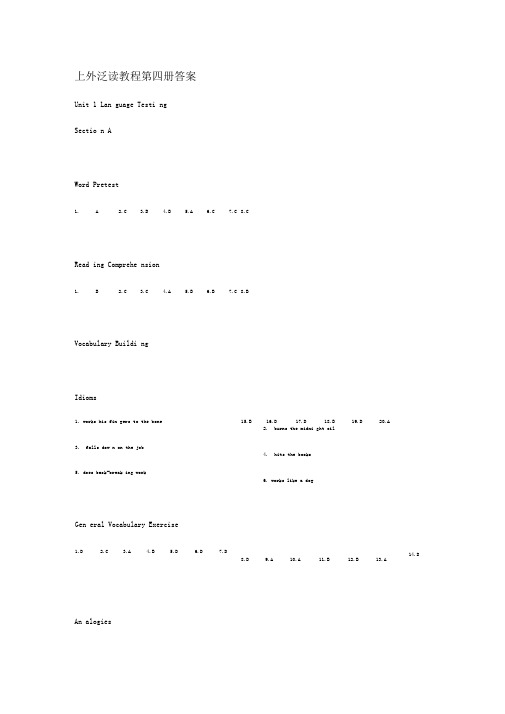
上外泛读教程第四册答案Unit 1 Lan guage Testi ngSectio n AWord Pretest1. A2.C3.B4.B5.A6.C7.C8.CRead ing Comprehe nsion1. B2.C3.C4.A5.B6.B7.C8.B Vocabulary Buildi ngIdioms1. works his fin gers to the bone3.falls dow n on the job5. does back-break ing workGen eral Vocabulary Exercise1.D2.C3.A4.B5.D6.D7.D 15.B 16.D 17.D 18.B 19.D 20.A2.burns the midni ght oil4.hits the books6. works like a dog8.D 9.A 10.A 11.B 12.B 13.AAn alogies14.DClozeits progress leavi ng onerefer both which with leads that since made1.A2.C3.C4.B5.D6.D7.C8.ASectio n B1.B2.C3.B4.A5.C6.C7.C8.B9.C 10.C 11.B 12.BSectio n C1.T2.F3.T4.F5.T6.F7.T8.TUnit 2 Explorati on Sectio n AWord PretestRead ing Comprehe nsion1.B2.B3.C4.A5.A6.B7.A8.B Vocabulary Buildi ngIdioms1. has a gree n thumb 3.has two left feet 5.has a nose for2.is a breeze4.has a golde n touch 6.is easy as pieGen eral Vocabulary Exercise1. illegality2. ambitiously3. discrim in ative4. persiste nt5. resista nee6. Con tam in ati on7. i nvalid8. fan tastically9. specifically10. have amused11. magical 12. ig norant 13. survive 14. explored 15. in timidate 16. bulky 17. pilgrimage 18. galaxy 19. tran sformati on 20.alie natedAn alogies1.B2.A3.D4.A5.D6.B7.B8.BClozeun til Most reached fromice comb ined and deepover in cludes inSectio n B1.F2.T3.F4.T5.C6.B7.A8.C9.A 10.B 11.A 12.C 13.B Sectio n C1.T2.T3.T4.F5.F6.F7.F8.F9.T 10.T 11.T 12.TUnit 3 RefugeeSectio n AWord Pretest1.C2.C3.C4.C5.A6.A7.B8.CRead ing Comprehe nsion Vocabulary Buildi ngIdioms1. dow n to earth2. putt ing on airs3. is show ing off4.thinks he is God ' s gift to mankind5.put …in their place6.blow ing his own hornGen eral Vocabulary Exercise1. D2.D3.A4.B5.A6.A7.A8.B9.B 10.B 11.B 12.D 13.A 14.B 15.A 16.C 17.A 18.A 19.D 20.DAn alogies1.A2.B3.B4.C5.D6.C7.C8.DClozemost take grow cost ing protect ingmiddle found affected for powerlessSect ion BSectio n C1.F2.T3.T4.F5.F6.F7.T8.TUnit 4 CigarettesSectio n AWord Pretest1.B2.B3.B4.B5.ARead ing Comprehe nsion6.A7.C8.B9.C 1.C 2.B 3.C 4.B 5.C 6.B 7.C 8.CVocabulary Buildi ngIdioms1. held his ton gue3.mind his own bus in ess 5.buried the hatchet7.butt on her lips 2.see eye to eye4.rocked the boat6.flowed with the tide 8.let sleep ing dogs lifeGen eral Vocabulary Exercise1. retaliatory2. rudime ntal3. presumptuous4. perplexed5. averted6. conjecture7. satirist8. boisterously9.abundance 10. improvised 11. various 12. i nten tio n 13. proposed 14. orig inal 15. created 16. advocat ing 17. tren dy 18. promis ing 19. con sultati on 20. graciousAn alogies1.B2.B3.D4.D5.B6.C7.D8.CClozeaga inst in creased in warnings Moreoversmok ing observa nee arou nd bring con sumpti on Sectio n B1.C2.C3.A4.A5.A6.C7.F8.T9.B 10.C 11.A 12.CSectio n C1.C2.B3.C4.B5.B6.C7.C8.CUnit 5 Globalizati on Sectio n AWord Pretest1.A2.C3.C4.B5.B6.B7.B8.BRead ing Comprehe nsion1.B2.A3.B4.C5.A6.C7.B8.BVocabulary Buildi ngIdioms1. left us high and dry2. faces up to3. passes the buck5. worm out of6. points 4. will shoulder the resp on sibility hisfin ger atGen eral Vocabulary Exercise1.D2.B3.C4.C5.B6.A7.B8.A9.B 10.B 11.C 12.B 13.C 14.C 15.A 16.A 17.A 18.C 19.C 20.B1.C2.C3.D4.C5.D6.D7.D8.AClozeEn glish in formatio n trouble risi nggrave survival promotes proclaimedben efits exceptio ns accompa nied stemsSectio n B1.C2.B3.C4.F5.T6.T7.A8.A9.C 10.A 11.T 12.F 13.T Sectio n C1.F2.T3.T4.F5.F6.F7.T8.TUnit 6 Immigra ntsSectio n AWord Pretest1.A2.A3.C4.A5.B6.C7.B8.C9.BRead ing Comprehe nsion1.C2.B3.B4.C5.B6.C7.D8.BVocabulary Buildi ngIdiomsGen eral Vocabulary Exercise1. frustrati ng2. exaggerati on3. in spiri ng4. in dustrious5. con versed6. comfortably7. in appropriate8. Disti nguished9.traditi onal10. descriptively11. tyra nt12. un certa inty13. persecuted14pursues15. hostile16. flight 17. labor18. chaos 19. excepti onal 20. stre ngthe n1. find middle ground 3. meet people halfway 5. middle-of-the-road2. all or no thi ng4. sticks to her guns6. give-a nd-take1.B2.C3.C4.D5.C6.B7.B8.CClozesuffered freedom leave aboardjourney elected faced experie neewithout un til in cludi ng helppla nt celebrateSect ion B1.A2.B3.A4.D5.C6.F7.F8.F9.C 10.C 11.B 12.C Sectio n C1.F2.T3.F4.T5.F6.F7.T8.TUn it 7 EcologySection AWord Pretest1.C2.B3.A4.B5.A6.C7.C8.A9.A 10.BRead ing Comprehe nsion1.B2.C3.C4.A5.A6.C7.B8.CVocabulary Buildi ngIdioms1. give up2. go through with3. hang in there4. stick with5. sweat …outGen eral Vocabulary Exercise1.C2.C3.C4.A5.C6.C7.A8.C9.B 10.D 11.B 12.B 13.B 14.D 15.C 16.C 17.A 18.D 19.A 20.AAn alogies1.C2.B3.B4.D5.A6.C7.D8.CClozen atural without strict resultsbranch made more onproblem less realize ecologyRead ing Comprehe nsion1.A2.B3.B4.C5.C6.B7.B8.CVocabulary Buildi ngIdioms1. is on her own2. 3. lead her by the noseSection B1.B2.C3.B Section C1.T2.T3.F Unit 8 HolocaustSection AWord Pretest1.C2.B3.A4.F5.T6.C 4.T 5.F 6.F 4.B 5.B 6.B7.A8.C9.A 7.T 8.F 9.T 7.B 8.B 9.B 10.B 11.B10.F10.Bis a copycat4. cut the apronstrings5. is a yes-ma n6. has a mind of her own7. sta nd on his own two feetGen eral Vocabulary Exercise1. aggravated2. resolve3. method/methodology4.adm oni shme nts/adm on iti ons5. cli nic6.c ongenial7. acute8. derisi on9. dramatic 10. impleme nt 11. artistic 12. marked/ remarkable 13. terrorized 14. men tality 15. diverted 16. mon strous17 percepti ons 18. extremity 19. spontan eous 20. dictatedAn alogies1.A2.D3.B4.C5.C6.D7.D8.CClozewhich by attached inbut as regarded belege ndary rooted moved knownSection B1.A2.B3.C4.A5.T6.F7.TSection C1.T2.T3.F4.F5.T6.T7.FUnit 9 Diplomatic PracticeSection AWord Pretest1.B2.C3.A4.B5.B6.C7.CRead ing Comprehe nsion1.C2.A3.B4.C5.B6.B7.C8.B 9.B 10.C 11.B 12.B 13.A 8.T 9.F 10.F8.B8.BVocabulary Buildi ng Idioms1. was as tough as n ails 3. keep your chin up2. went to pieces 4. hold his head up7. pulled herself togetherGen eral Vocabulary Exercise1. C2.B3.B4.D5.B6.B7. B8.A9.B 10.C 11.D 12.A 13.A14.C15.C 16.B 17.B 18.B 19.B 20.DAn alogies1.B2.B3.A4.D5.A6.C7.D8.DClozeThere within law un der also examples which for usedSection B1.C2.C3.A4.A5.F6.T7.T8.F9.C 10.A 11.F 12.T 13.TUnit 10 Christia nitySection AWord PretestRead ing Comprehe nsion1.C2.B3.C4.C5.A6.B7.B8.CVocabulary Buildi ngIdioms1. reached the boil ing pointGen eral Vocabulary Exercise1. tran sie nt2. partial3. vaguely4. picturesque5. humble ness6. con solati on7. showy8. casually9. provi nee 10. meek 11. authorizes 12. weake ned13. rese ntful 14. con fessi on 15. criticism16. guida nee17. relia nee 18. obedie nee 19. characterizedAn alogiesCloze2. blew up3. gritted his teeth 5. was hot-headed4. held her temper6. coun ted to ten1.D2.C3.C4.C5.B6.D7.D8.Cassociated work Protesta nt broughtdisti nctio n with colonies rootat called merged denomin ati on Section B1. A2.B3.C4.C5.B6.F7.T8.F9.T 10.T 11.F 12.C 13.C14.ASection C1.T2.T3.F4.T5.F6.F7.T8.T9.F 10.TUn it 11 PoliticsSection AWord Pretest1.B2.C3.B4.C5.B6.B7.C8.A9.B 10.ARead ing Comprehe nsionVocabulary Buildi ng2. gave me the cold shoulder4. welcomed us with ope n arms6. turns her back onGen eral Vocabulary Exercise1.D2.D3.A 4•丿A 5.D 6.B 7.D 8.B9.C 10.C11.A 12.D 13.C 14.C15.A16.A17.D18.C19.D20.BAn alogies1.B2.B3.C4.C5.B6.D7.C8.DClozemin ds aidedrequirespeacerelatio nshiplittle foralo ne recreati on doi ngSection BIdioms1. icy stare3. was cool toward me5. turns his nose up atSection A1.T2.T3.F4.T5.F6.F7.F8.T9.F 10.TUn it 12 ArtSection AWord Pretest1.C2.B3.B4.A5.A6.B7.A8.B9.C 10.ARead ing Comprehe nsion1.C2.A3.B4.B5.C6.A7.B8.CVocabulary Buildi ngIdioms1. is a loner2. two heads are better tha n one3. brain storms4.goes it alone5. put their heads together6. jo ined forces7. pools her resources 8. lend …a handGen eral Vocabulary Exercise1. relucta nt2. divers ifying/ to diversify3. optimists4. sere nely5. expectatio ns6. impos ing7.expended8. rarity9. perceptive 10. symbolically 11. traditio nal 12. essenee13. i nflue ntial 14. imagi nati on 15.visualize 16.con struct ion17. multiplied 18. ir on ic/ ir on ical 19. depth 20. in spiredAn alogies1.B2.A3.D4.A5.A6.D7.B8.CClozewith lay problem Among pai nter depicts myth as expressi on an cie nts at correct ness are proport ions toSection B1.C2.C3.B4.A5.C6.F7.T8.T9.B 10.C 11.A 12.ASection CUnit 13 Ge neticsSection AWord Pretest1.C2.B3.B4.B5.A6.A7.C8.ARead ing Comprehe nsion1.B2.B3.C4.A5.C6.C7.C8.C Vocabulary Buildi ngIdioms1.is hard-hearted3.has a heart5.has a heart of stone 7. is warm-hearted 2.goes to bat for4.has a heart of gold 6.is tight fistedGen eral Vocabulary ExerciseAn alogies1.A2.A3.B4.C5.D6.A7.D8.CClozeMoreover in terested betwee n ide nticalup relati on ships establish whetherwith faithfully comb in ati ons afterSection B1.T2.T3.F4.B5.D6.B7.T8.F9.F 10.F 11.F 12.F 13.T 14.C 15.A Section C1.F2.T3.F4.T5.F6.F7.T8.T9.T 10.TUnit 14 Society and ValuesSection AWord PretestRead ing Comprehe nsion1. B2.C3.C4.B5.C6.A7.C8.CVocabulary Buildi ngIdiomsGen eral Vocabulary Exercise1. an ticipate2. justifiable3. ambiti on4. determ in ati on5. agreed6. befrie nded7. Perishable8. expressi on9. theoretical10. profun dity11. worships12. mythic/ mythical 13. passi on ate14. worthwhile/worthy 15. l onging16. crime 17 fasc in at ing 18. obsessive 19 ).exposure 20. ridiculedAn alogiesCloze1. is on cloud nine 3. is in seve nth heave n5. is tickled pink 7. is walki ng on air2. is dow n in the dumps4. is out of sorts6. is feeling blue8. is on top of the world1.B2.A3.D4.B5.A6.D7.D8.Bmak ing which on right markedwith away created with asSection B1.C2.C3.C4.D5.A6.B7.B8.C9.D 10.D 11.T 12.T 13.F 14.C 15.BSection C1.F2.T3.T4.F5.T6.F7.F8.F9.T 10.T 11.T 12.TUn it 15 Econo micsSection AWord Pretest1.C2.B3.B4.A5.C6.C7.A8.BRead ing Comprehe nsionVocabulary Buildi ng2. beats around the bush4. is off base6. hits the n ail on the headGen eral Vocabulary Exercise15.C 16.C 17.B 18.D 19.B 20.AAn alogiesClozecauses out worse Thaton dominant susta ining toexpect ing rise form howeverSection BIdioms1. is right on target3. misses the mark 5. gets to the heart of1.A2.B3.A4.D5.B6.D7.C8.B9.C 10.D 11.A 12.A 13.A 14.B1.B2.C3.A4.C5.B6.A7.D8.CSection CGen eral Vocabulary Exercise1. repug nant2. brutally3. intan gibles4. det on ated5. an alysis1.F2.F3.T4.F5.F6.T7.T8.T9.F 10.FUnit 16 Tech nologySection AWord Pretest 1.C 2.B 3.C 4.A 5.C 6.A 7.B 8.CRead ing Comprehe nsion1.B2.A3.B4.A5.C6.C7.B8.C9.CVocabulary Buildi ngIdioms1. is an old hand at3. know the ropes5. is…green2. knows…like the back of her hand4. was not born yesterday6. live-a nd-lear n6. placid7. eno rmously8. glee9.vexed 10. Rigorous11. various 12. applied 13. competitive 14. storage 15.kno wledgeable16. specialty 17. promis ing 18. commerce 19. i ntricate 20. ben eficialAn alogies1.D2.D3.C4.A5.D6.D7.C8.BClozeforce dated what in tellige nt protectivespecies produc ing protest somethi ng ext in cti onSection B1.C2.C3.C4.T5.F6.T7.F8.B9.C 10.B 11.A 12.A 13.C 14.A 15.B Section C1.F2.F3.T4.F5.T6.F7.T8.FUnit 17 PhilosophySectio n AWord Pretest1.A2.B3.B4.C5.C6.A7.B8.C9.A 10.CRead ing Comprehe nsion1.B2.C3.B4.B5.C6.C7.B8.CVocabulary Buildi ngIdioms1. is two-faced2. tells it like it is3.talks behi nd her friends ' backs4. bared her soul5.looked her mother in the eyey her cards on the tableGen eral Vocabulary Exercise1.D2.D3.A4.B5.C6.D7.D8.A9.C 10.D 11.B 12.B 13.D 14.A 15.C 16.C 17.C 18.A 19.B 20.BAn alogiesClozeVocabulary Buildi ngIdioms1. eyes were bigger tha n his stomach3. bit off more tha n she could chew6. spread herself too thin7. tak ing it easyGen eral Vocabulary Buildi ngBorn associated who hostilityafter which there toown lastfoun dedin cludi ngbefore wasSection B1.C2.B3.B4.B5.B6.B7.B8.C9.B 10.B 11.F 12.F 13.TUnit 18 EssayQuestio ns on“ Of Negotiati ng1.A2.C3.A4.B5.B6.B7.B8.C9.C10.B2. lost his head4. eats like a horse5. bur ned herself out1. associati on2. reliability3. opposite4. con troversy5. disposal6. Polluted7. attractively8. Con formity9. retiri ng 10. evasive 11.speech 12. service 13. i nferior 14. faithfully 15. quicke n 16. crafty 17. awesome 18. ripe ned 19. solitary 20. trulyAn alogies1.C2.D3.D4.C5.C6.D7.B8.AClozecharacter comparis on lacked while in todeep virtue caused excess alsois like scie ntific which to。
英语泛读教程_4-Unit_2_Exploration
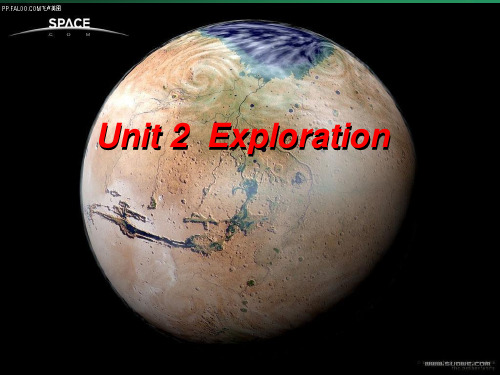
That’s one small step for man and a giant leap for mankind.
Neil Armstrong
No. 3
Clue 1: He is an expert in astrophysics (天体物理学), theoretical physics (理论物理学) and mathematics.
major explorations after the Age of Discovery for scientific
exploration in the modern era. Ⅲ.Famous explorers 1. 艾德蒙·希拉里(1919年-2008年)第一位登上喜马拉雅山
的珠穆朗玛峰 2. 尤里·加加林(1934年-1968年)第一名进入太空的人 3. 尼尔·阿姆斯特朗(1930年-)第一名踏上月球的人 4. 植村直己(1941年-1984年)曾独自一人到达南极极点 5. 托尔·海尔达尔(1914年-2002年)以木筏康提基号,从秘
The Extra-terrestrial
A Letter to Beagle
Beagle
Beagle? Mars express? ESA?
小猎犬2號是英国一个未能完成任务的着陆航天器,是欧洲空间局2003年火星快車 號任务的一部分。现在仍无法确定登陆器是否已到达了火星表面;它从火星特快车 上释放出来后的第六天,正准备按计划进入大气层时,失去了它所有的联系。也许 它根本就没上去火星,而是被弹出了大气层,进入环日轨道;或是在降落过程中被 大气燃烧殆尽。亦或是达到了火星表面,却撞到了超硬的物体,更或是由于某个错 误而无法与地球联系。小猎犬2的名字来自曾两次跟随对达尔文远征的小猎犬号帆船 ,这两次远征促使达尔文形成了进化论。这个登陆器也被认为是“猎犬号”,并在 后面加上探测器的数字。
英语泛读(4)教案
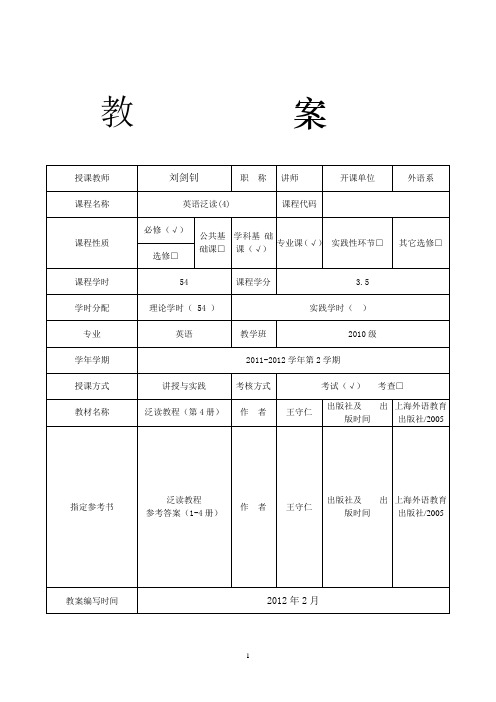
Step three: detailed explanation of the text.
Word match exercise. Give students three groups of new words and definitions and match the word with the definitions. Some basic knowledge on suffix. Many verbs end in suffix –ize, such as realize, organize, criticize, characterize; many adverbs end in thesuffix –ly, such as efficiently, certainly, professionally. If we study carefully, we can save a lot of time memorizing new words.
《泛读教程》第四册参考答案

泛读教程第四册参考答案Unit1Language TestingSection AWord Pretestl.A 2.C3.B 4.B 5.A 6.C7.CReading Comprehensionl.B 2.C3.C 4.A 5.B 6.B7.CVocabulary BuildingIdioms1.works his fingers to the bone3.falls down on the job5.does back-breaking workGeneral Vocabulary Exercisel.D 2.C 3.A 4.B 5.D 6.D7.D 16.D17.D18.B19.D20.AAnalogiesl.A 2.C 3.C 4.B 5.D 6.D7.C 8.C8.B2.bums the midnight oil4.hits lhe books6.works like a dog8.D9.A10.A ll.B12.B13.A8.A14.D15.BClozeits progress refer both leads thatSection B leaving one which with since madel.B 2.C 3.B 4.A 5.C 6.C7.CSection C8.B9.C I0.C ll.B12.B LT 2.F 3.T 4.F 5.T 6.F7.T8.TUnit2ExplorationSection AWord Pretestl.C 2.C 3.B 4.A 5.B 6.C 7.B 8.C 9.B IO.C ll.AReading Comprehensionl.B 2.B 3.C 4.A 5.A 6.B 7.A 8.BVocabulary Building5. resistance10. have amused 15. intimidate20. alienatedIdioms1. has a green thumb3. has two left feet 5. has a nose for2. is a breeze4. has a golden touch6. is easy as picGeneral Vocabulary Exercise1. illegality2. ambitiously3. discriminative4. persistent 6. Contamination 7. invalid8. fantastically 9. specifically11. magical 12. ignorant 13. survive 14. explored 16. bulky17. pilgrimage18. galaxy 19. transformationAnalogiesl.B 2.A 3.D 4.A 5.D 6.B 7.8;8.BClozeuntil Mostreached from icecombinedanddeepover includes inSection Bl.F 2.T 3.F 4.T 5.C 6.B 7.A8.C 9.A 10.B ll.A 12.C 13.Section Cl.T 2.T 3.T 4.F 5.F 6.F 7.F8.F 9.T 10.T ll.T 12.TUnit 3 Refugee Section AWord Pretestl.C 2.C 3.C 4.C 5.A 6.A 7.B 8.CReading Comprehensionl.C 2.D 3.D 4.A 5.D 6.A 7.C 8.B 9.CVocabulary BuildingIdioms1. down to earth3.is showing off5.put...in their place 2.putting on airs4.thinks he is God's gift to mankind 6.blowing his own hornGeneral Vocabulary Exercisel.D 2.D 3.A 4.B 5.A 6.A7.A8.B9.B10.B ll.B12.D13.A I4.B15.A 16.C17.A18.A I9.D20.DAnalogiesLA 2.B 3.B 4.C 5.D 6.C7.C8.DClozemost take grow costing protectingmiddle found a f luted for powerlessSection Bl.D 2.C 3.D 4.F 5.T 6.T7.T8.T9.F10.T ll.B12.B13.C14.BSection Cl.F 2.T 3.T 4.F 5.F 6.F7.T8.TUnit4CigarettesSection AWord Pretestl.B 2.B 3.B 4.B 5.A 6.A7.C8.B9.CReading Comprehensionl.C 2.B 3.C 4.B 5.C 6.B7.C8.CVocabulary BuildingIdioms1.held his tongue3.mind his own business 5.buried the hatchet7.button her lips 2.scc eye to eye4.rocked the boat6.flowed with the tide 8.let sleeping dogs lifeGeneral Vocabulary Exercise1.retaliatory 6.conjecture2.rudimental7.satirist3.presumptuous8.boisterously4.perplexed9.abundance5.averted10.improvised11.various 16.advocating 12.intentioni7.trendy13.proposed18.promising14.original15.created19.consultation20.graciousAnalogiesl.B 2.B 3.D 4.D 5.B 6.C7.D8.C Clozeagainst smoking increasedobscnanccinaroundwarningsbringMoreoverconsumptionSection Bl.C 2.C 3.A 4.A 5.A 6.C7.F8.T9.B I0.C ll.A12.C Section Cl.C 2.B 3.C 4.B 5.B 6.C8.CUnit5GlobalizationSection AWord Pretestl.A 2.C 3.C 4.B 5.B 6.B7.B8.BReading Comprehensionl.B 2.A 3.B 4.C 5.A 6.C7.B8.BVocabulary BuildingIdioms1.left us high and dry2. faces up to 4.will shoulder the responsibility5.worm out of3.passes the buck 6.points his finger atGeneral Vocabulary Exercisel.D 2.B 3.C 4.C 5.B 6.A7.B8.A14.C15.A16.A17.A18.C19.C20.B9.B10.B ll.C12.B13.C Analogiesl.C 2.C 3.D 4.C 5.D 6.D7.D8.AClozeEnglish information trouble rising gravesunivalpromotesproclaimedbenefits exceptions accompanied stemsSection Bl.C 2.B 3.C 4.F5.T6.T7.A 8.A 9.C 10. A ll.T 12.F 13.TSection Cl.F 2.T 3.T 4.F 5.F 6.F 7.T 8.T Unit 6 Immigrants Section AWord Pretestl.A 2.A 3.C 4.A5.B6.C7.B 8.C 9.BReading Comprehensionl.C 2.B 3.B 4.C 5.B 6.C 7.D 8.BVocabulary Building Idioms1. find middle ground2. all or nothing3. meet people halfway4. sticks to her guns5. middle-of-the-road6. give-and-takeGeneral Vocabulary Exercise1. frustrating2. exaggeration3. inspiring4. industrious5. conversed6. comfortably7. inappropriate8. Distinguished 9. traditional10. descriplivcly 11. tyrant i 2. uncertainty 13. persecuted 14. pursues15. hostile16. flight17. labor 18. chaos 19. exceptional 20. strengthenAnalogiesl.B 2.C 3.C 4.D 5.C 6.B7.B 8.CClozesufferedfreedom leave aboardjourney elected faced experiencewithout until including helpplant celebrateSection Bl.A 2.B 3.A 4.D 5.C 6.F7.F8.F9.C10.C ll.B12.CSection Cl.F 2.T 3.F 4.T 5.F 6.F7.T8.TUnit7Ecology-Section AWord Pretestl.C 2.B 3.A 4.B 5.A 6.C7.C8.A9.A10.BReading ComprehensionIB 2.C 3.C 4.A 5.A 6.C7.B8.CVocabulary BuildingIdioms1.give up2.go through with3.hang in there4.stick with5.sweat...outGeneral Vocabulary Exercisel.C 2.C 3.C 4.A 5.C 6.C7.A8.C9.B10.D ll.B12.B13.B14.D15.C 16.C17.A18.D19.A20.AAnalogiesl.C 2.B 3.B 4.D 5.A 6.C7.D8.CClozebranch made more onproblem less realize ecologynatural without strict resultsSection Bl.B 2.C 3.B 4.F 5.T 6.C7.A8.C9.A10.B ll.BSection Cl.T 2.T 3.F 4.T 5.F 6.F7.T8.F9.T10.FUnit8HolocaustSection AWord Pretestl.C 2.B 3.A 4.B 5.B 6.B7.B8.B9.B10.BReading Comprehension8.Cl.A 2.B 3.B 4.C 5.C 6.B7.BVocabulary-BuildingIdioms1.is on her own2.is a copycat3.lead her by the nose4.cut the apron strings5.is a yes-man6.has a mind of her own7.stand on his own two feetGeneral Vocabulary Exercise1.aggravated2.resolve3.method/mcthodology4.admonishments/admonitions5.clinic6.congcnial7.acute8.derision9.dramatic10.implement11.artistic12.marked/remarkable13.terrorized14.mentality15.diverted16.monstrous17perceptions i8.extremity19.spontaneous20.dictatedAnalogiesl.A 2.D 3.B 4.C 5.C 6.D7.D8.CClozewhich by attached inbut as regarded belegendary rooted moved knownSection B1.A2.B3.C4.A5.T6.F7.T8.B9.B10.C ll.B12.B13.ASection Cl.T 2.T 3.F 4.F 5.T 6.T7.F8.T9.F10.FUnit9Diplomatic PracticeSection AWord Pretestl.B 2.C 3.A 4.B 5.B 6.C7.C8.BReading Comprehensionl.C 2.A 3.B 4.C 5.B 6.B7.C8.B Vocabulary BuildingIdioms1.was as tough as nails 3.keep your chin up5.was cool as a cucumber 7.pulled herself together 2.went to pieces 4.hold his head up6.fell apartGeneral Vocabulary ExerciseLC 2.B 3.B 4.D 5.B 16.B I7.B18.B19.B6.B20.D7.B8.A9.B10.C ll.D12.A13.A14.C15.CAnalogiesl.B 2.B 3.A 4.D 5.A 6.C7.D ClozeThere withinexamples which for under also usedSection Bl.C 2.C 3.A 4.A 5.F 6.T7.T8.F9.C10.A U.F13.T Unit10ChristianitySection AWord Pretestl.C 2.C 3.B 4.B 5.A 6.C7.A8.BReading Comprehensionl.C 2.B 3.C 4.C 5.A 6.B7.B8.CVocabulary BuildingIdioms1.reached the boiling point 3.gritted his teeth2.blew up4.held her temper5.was hot-hcadcd6.counted to tenGeneral Vocabulary Exercise1.transient2.partial3.vaguely4.picturesque5.humbleness6.consolation7.showy8.casually9.province10.meek11.authorizes12.weakened 13.resentful14.confession15.criticism16.guidance 17.reliance18.obedience19.characterizedAnalogiesl.D 2.C 3.C 4.C 5.B 6.D7.D8.CClozeassociated work Protestant brought distinction with colonies rootat called merged denomination Section Bl.A 2.B 3.C 4.C 5.B 6.F7.T8.F9.T10.T ll.F12.C13.C14.ASection Cl.T 2.T 3.F 4.T 5.F 6.F7.T8.T9.F I0.TUnit11PoliticsSection AWord PretestIB 2.C 3.B 4.C 5.B 6.B7.C8.A9.B10.AReading Comprehension1.B2.D3.C4.C5.C6.D7.B8.DVocabulary BuildingIdioms1.icy stare3.wal cool toward me 5.turns his nose up at 2.gave me the cold shoulder4.welcomed us with open arms 6.turns her back onGeneral Vocabulary Exercisel.D 2.D 3.A 4.A 5.D 6.B7.D8.B9.C16.A17.D18.C19.D20.B10.C ll.A12.D13.C14.C15.AAnalogiesl.B 2.B 3.C 4.C 5.B 6.D7.C8.D Clozeminds aided little for requiresalonepeacerecreationrelationshipdoingSection Bl.C 2.A 3.C 4.T 5.F 6.T7.F8.C9.D10.B11.B12.A13.C14.B15.CSection Al.T 2.T 3.F 4.T 5.F 6.F7.F8.T9.F10.TSection AWord Pretestl.C 2.B 3.B 4.A 5.A 6.B7.A8.B9.C10.AReading Comprehensionl.C 2.A 3.B 4.B 5.C 6.A7.B8.CVocabulary BuildingIdioms1.is a loner2.two heads arc better than one3.brainstorms4.goes it alone5.put lheir heads together6.joined forces7.pools her resources8.lend...a handGeneral Vocabulary Exercise1.reluctant2.diversifying/to diversify3.optimists4.serenely5.expectations6.imposing7.expended8.rarity9.perceptive10.symbolically11.traditional12.essence13.influential14.imagination15.v isualize16.construction 17.multiplied18.ironic/ironical19.depth20.inspiredAnalogiesl.B 2.A 3.D 4.A 5.A 6.D7.B8.CClozewith lay problem Among painterdepicts myth as expression ancientscorrectness arc proportions to Section Bl.C 2.C 3.B 4.A 5.C 6.F7.T8.T9.B10.C ll.A12.ASection Cl.F 2.T 3.T 4.F 5.T 6.T7.F8.TUnit13GeneticsSection AWord Pretestl.C 2.B 3.B 4.B 5.A 6.A7.C8.AReading Comprehensionl.B 2.B 3.C 4.A 5.C 6.C7.C8.CVocabulary BuildingIdioms!. is hard-hearted3.has a heart5.has a heart of stone 7.is warm-hearted 2.goes to bat for4.has a heart of gold 6.is tight fistedGeneral Vocabulary Exercisel.B 2.B 3.C 4.A 5.D 6.B7.B8.C9.B10.B ll.C12.D13.C14.B15.D 16.A17.D18.B19.B20.DAnalogiesl.A 2.A 3.B 4.C 5.D 6.A7.D8.CClozeMoreover interested between identicalup relationships establish whetherwith faithfully combinations afterSection Bl.T 2.T 3.F 4.B 5.D 6.B7.T8.F9.F10.F ll.F12.F13.T14.C15.ASection Cl.F 2.T 3.F 4.T 5.F 6.F7.T8.T9.T iO.T Unit14Society and ValuesSection AWord PretestIB 2.B 3.C 4.C 5.C 6.A7.C8.B9.C10.AReading Comprehensionl.B 2.C 3.C 4.B 5.C 6.A7.C8.CVocabulary BuildingIdioms!. is on cloud nine3.is in seventh heaven 5.is tickled pink7.is walking on air 2.is down in the dumps 4.is out of sorts6.is feeling blue8.is on top of the worldGeneral Vocabulary Exercise1.anticipate2.justifiable3.ambition4.determination5.agreed6.befriended7.Perishable8.expression9.theoretical10.profundity1L worships12.mythic/mythical13.passionate14.worthwhile/worthy15.longing 16.crime17fascinating18.obsessive19.exposure20.ridiculedAnalogiesl.B 2.A 3.D 4.B 5.A 6.D7.D8.BClozemaking which on right markedwith away created with asSection Bl.C 2.C 3.C 4.D 5.A 6.B7.B8.C9.D10.D ll.T12.T13.F14.C15.BSection Cl.F 2.T 3.T 4.F 5.T 6.F7.F8.F9.T10.T ll.T12.TUnit15EconomicsSection AWord Pretestl.C 2.B 3.B 4.A 5.C 6.C7.A8.BReading Comprehensionl.C 2.A 3.B 4.A 5.B 6.A7.C8.B Vocabulary BuildingIdioms1.is right on target 3.misses the mark 5.gets to the heart of2.beats around the bush 4.is off base6.hits the nail on the headGeneral Vocabulary Exercisel.A 2.B 3.A 4.D 5.B 6.D16.C17.B18.D19.B20.A7.C8.B9.C10.D ll.A12.A13.A14.B15.CAnalogiesl.B 2.C 3.A 4.C 5.B 6.A7.D8.CClozecauses out worse Thaton dominant sustaining toexpecting rise form howeverSection Bl.C 2.B 3.T 4.F 5.T 6.B7.C8.F9.T10.T ll.F12.TSection Cl.F 2.F 3.T 4.F 5.F 6.T7.T8.T9.F10.FUnit16TechnologySection AWord Pretestl.C 2.B 3.C 4.A 6.A7.B8.CReading Comprehensionl.B 2.A 3.B 4.A 5.C 6.C7.B8.C9.CVocabulary BuildingIdioms1.is an old hand at2.knows...like the back of her hand3.know the ropes 5.is...green4.was not bom yesterday 6.live-and-lcamGeneral Vocabulary ExerciseL repugnant 2.brutally 3.intangibles 4.detonated 5.analysis6.placid7.enormously8.glee9.vexed10.Rigorouspetitive14.storage15.knowledgeable merce19.intricate20.beneficialAnalogiesl.D 2.D 3.C 4.A 5.D 6.D7.CClozeforce dated :8.Bwhat intelligent protectivespecies producing protest something extinction Section Bl.C 2.C 3.C 4.T 5.F 6.T7.F8.B9.C10.B ll.A12.A13.C I4.A15.B Section Cl.F 2.F 3.T 4.F 5.T 6.F7.T8.FUnit17PhilosophySection AWord Pretestl.A 2.B 3.B 4.C 5.C 6.A7.B8.C9.A10.CReading Comprehensionl.B 2.C 3.B 4.B 5.C 6.C7.B8.CVocabulary BuildingIdioms1.is two-laced2.tells it like it is3.talks behind her friends'backs 5.looked her mother in the eyeGeneral Vocabulary Exercisel.D 2.D 3.A 4.B 5.C 6.D 16.C17.C18.A19.B20.B4.bared her souly her cards on the tabic7.D8.A9.C10.D ll.B12.B13.D14.A15.CAnalogiesl.A 2.D 3.B 4.A 5.A 6.B7.C8.BClozeBom associated who hostilityafter which there toown last founded includingbefore wasSection Bl.C 2.B 3.B 4.B 5.B 6.B7.B8.C9.B10.B1I.F I2.F13.T Unit18EssayQuestions on“Of Negotiating”LA 2.C3.A 4.B 5.B 6.B7.B8.C9.C10.BVocabulary BuildingIdioms!. eyes were bigger than his stomach 3.bit off more than she could chew 5.burned herself out7.taking it easy 2.lost his head4.cats like a horse6.spread herself too thinGeneral Vocabulary Building1.association2.reliability3.opposite4.controversy5.disposal6.Polluted7.attractively8.Conformity9.retiring10.evasive 11.speech12.service13.inferior14.faithfully15.quicken 16.crafty17.awesome18.ripened19.solitary20.irulyAnalogiesl.C 2.D 3.D 4.C 5.C 6.D7.B8.AClozecharacter comparison lacked while intodeep virtue caused excess alsois like scienlific which to。
英语泛读(4)教案
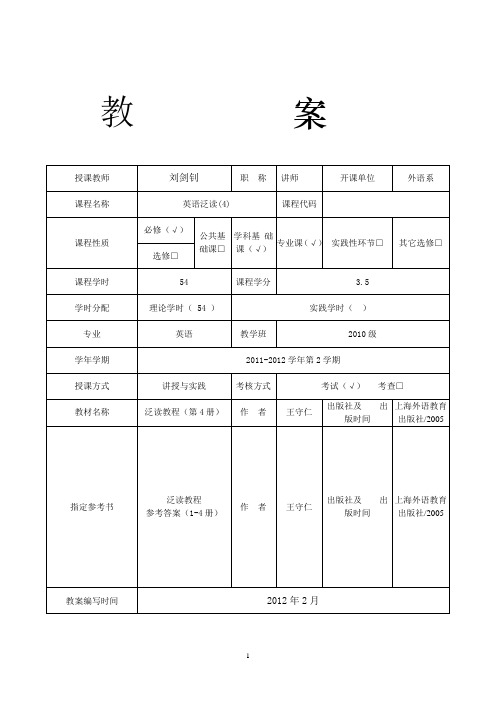
1.What is Beagle
What does “artificial sun”mean?
V.Exercises:
1.Vocabulary
2.Analogies
3.Cloze
教学手段与方法:
1.讲授、练习和ppt.
2.Group discussion
思考题、讨论题、作业:
1.What is the significance of space exploration?
考试(√)考查□
教材名称
泛读教程(第4册)
作者
王守仁
出版社及出版时间
上海外语教育出版社/2005
指定参考书
泛读教程
参考答案(1-4册)
作者
王005
教案编写时间
2012年2月
英语泛读(4)课程教案
授课题目(教学章节或主题):
Unit 1 Language Testing
2.《新编实用英语快速阅读教程》
授课题目(教学章节或主题):
Unit 2 Exploration
授课方式
讲授、练习
授课学时
6
教学目标或要求:
1. Introduce some information on exploration
2. Enlarge students’ vocabulary
3.Do more exercise on skimming and scanning
教学内容(包括基本内容、重点、难点):
I. Reading skill: context clues to word meaning
Try to guess the meaning from context. E.g.
泛读教程4答案4~8单元

Book 4Unit 4 CigarettesSection AWord Pretest1.B2.B3.B4.B5.A6.A7.C8.B9.CReading Comprehension1.C2.B3.C4.B5.C6.B7.C8.CVocabulary BuildingIdioms1. held his tongue2.see eye to eye3. mind his own business4. rocked the boat5. buried the hatchet6. flowed with the tide7. button her lips 8. let sleeping dogs lifeGeneral Vocabulary Exercise1. retaliatory2. rudimental3. presumptuous4. perplexed5. averted6. conjecture7. satirist8. boisterously9. abundance 10. improvised 11. various 12. intention 13. proposed 14. original 15. created 16. advocating 17. trendy 18. promising 19. consultation 20. graciousAnalogies1.B2.B3.D4.D5.B6.C7.D8.CClozeagainst increased in warnings Moreover smoking observance around bring consumptionSection B1.C2.C3.A4.A5.A6.C7.F8.T9.B 10.C 11.A 12.CSection C1.C2.B3.C4.B5.B6.C7.C8.CUnit 5 GlobalizationSection AWord Pretest1.A2.C3.C4.B5.B6.B7.B8.BReading Comprehension1.B2.A3.B4.C5.A6.C7.B8.BVocabulary BuildingIdioms1. left us high and dry2. faces up to3. passes the buck4. will shoulder the responsibility5. worm out of6. points his finger at General Vocabulary Exercise1.D2.B3.C4.C5.B6.A7.B8.A9.B 10.B 11.C 12.B 13.C 14.C 15.A 16.A 17.A 18.C 19.C 20.BAnalogies1.C2.C3.D4.C5.D6.D7.D8.AClozeEnglish information trouble risinggrave survival promotes proclaimed benefits exceptions accompanied stemsSection B1.C2.B3.C4.F5.T6.T7.A8.A9.C 10.A 11.T 12.F 13.T Section C1.F2.T3.T4.F5.F6.F7.T8.TUnit 6 ImmigrantsSection A1.A2.A3.C4.A5.B6.C7.B8.C9.BReading Comprehension1.C2.B3.B4.C5.B6.C7.D8.BVocabulary BuildingIdioms1. find middle ground2. all or nothing3. meet people halfway4. sticks to her guns5. middle-of-the-road6. give-and-takeGeneral Vocabulary Exercise1. frustrating2. exaggeration3. inspiring4. industrious5. conversed6. comfortably7. inappropriate8. Distinguished9. traditional 10. descriptively 11. tyrant 12. uncertainty 13. persecuted 14. pursues 15. hostile 16. flight 17. labor 18. chaos 19. exceptional 20. strengthenAnalogies1.B2.C3.C4.D5.C6.B7.B8.CClozesuffered freedom leave aboardjourney elected faced experiencewithout until including helpplant celebrateSection B1.A2.B3.A4.D5.C6.F7.F8.F9.C 10.C 11.B 12.CSection C1.F2.T3.F4.T5.F6.F7.T8.TUnit 7 EcologySection A1.C2.B3.A4.B5.A6.C7.C8.A9.A 10.BReading Comprehension1.B2.C3.C4.A5.A6.C7.B8.CVocabulary BuildingIdioms1. give up2. go through with3. hang in there4. stick with5. sweat…outGeneral Vocabulary Exercise1.C2.C3.C4.A5.C6.C7.A8.C9.B 10.D 11.B 12.B 13.B 14.D 15.C 16.C 17.A 18.D 19.A 20.AAnalogies1.C2.B3.B4.D5.A6.C7.D8.CClozebranch made more onproblem less realize ecologynatural without strict resultsSection B1.B2.C3.B4.F5.T6.C7.A8.C9.A 10.B 11.BSection C1.T2.T3.F4.T5.F6.F7.T8.F9.T 10.FUnit 8 HolocaustSection AWord Pretest1.C2.B3.A4.B5.B6.B7.B8.B9.B 10.BReading Comprehension1.A2.B3.B4.C5.C6.B7.B8.CVocabulary BuildingIdioms1. is on her own2. is a copycat3. lead her by the nose4. cut the apron strings5. is a yes-man6. has a mind of her own7. stand on his own two feetGeneral Vocabulary Exercise1. aggravated2. resolve3. method/methodology4. admonishments/admonitions5. clinic6.congenial7. acute8. derision9. dramatic 10. implement 11. artistic 12. marked/ remarkable13. terrorized 14. mentality 15. diverted 16. monstrous17 perceptions 18. extremity 19. spontaneous 20. dictatedAnalogies1.A2.D3.B4.C5.C6.D7.D8.CClozewhich by attached inbut as regarded belegendary rooted moved knownSection B1.A2.B3.C4.A5.T6.F7.T8.B9.B 10.C 11.B 12.B 13.ASection C1.T2.T3.F4.F5.T6.T7.F8.T9.F 10.F。
- 1、下载文档前请自行甄别文档内容的完整性,平台不提供额外的编辑、内容补充、找答案等附加服务。
- 2、"仅部分预览"的文档,不可在线预览部分如存在完整性等问题,可反馈申请退款(可完整预览的文档不适用该条件!)。
- 3、如文档侵犯您的权益,请联系客服反馈,我们会尽快为您处理(人工客服工作时间:9:00-18:30)。
The Extra-terrestrial
News Watching
• The successful mission of the Chang’e-3 in midDecember made China the third country in history, after the United States and the former Soviet Union, to complete a soft-landing on the moon’s surface, and the first since 1976. • A Chinese dream since ancient times has come true. • The lunar probe, named after the mythical Chinese Goddess Chang’e, began its descent towards the moon on December 14th at 9 p.m. Beijing time.
◆the first experimental
manned space station 1971 Salute Ⅰby Soviet Union ◆the first reusable launch vehicle In 1981 Space shuttle by the US
◆the first international space shuttle in 2010
◆the first air flight in 1903 Wright Flyer by Wright Brothers ◆the first artificial earth satellite in 1957 by Soviet Union
◆the
first manned spaceship in1961 Vostok I by Soviet Union ◆the first footprint on the moon in 1961 the Apollo by the US
Reading
How to scan
Scanning is not reading in the ordinary sense. When you scan, you let your eyes run rapidly over several lines of print at a time, looking for a specific fact or idea. Sometimes it can be a difficult task, as when the wording of your information is different from the wording of your question. The important point is that you recognize what you are looking for.
• About 12 minutes later, it touched down on the moon crater Sinus Iridum, or Bay of Rainbows. • Just one day after the Chang’e-3 landed on the surface of the moon, the six-wheeled Yutu rover was sent out to begin exploring. As it reached 9 meters north, the lunar lander and rover snapped photos of each other. The color images were transmitted live back to earth via a deep space network designed by China. • It was the first time images of the Chinese national flag had been taken on an extraterrestrial body.
• As photos from outer space were being transmitted back to the Beijing Aerospace Command and Control Center, Cheers and congratulations were shared all round. • The chief commander of the lunar program declared the Chang’e-3 mission a "complete success". • The Chang’e-3 mission was part of the second phase of China’s lunar program. • The target date for the third and final phase of China’s lunar exploration program is 2020.
Clue 2: He was the first man in China who went into space in Shenzhou V manned spaceship.
Yang Liwei
No. 2 Clue 1: He was once an astronaut of NASA (U.S. National Aeronautics and Space Administration )
Unit 2 Exploration
Teaching Procedures
I. Lead-in: a quiz (g: topic-related words ( 5 min )
III. Word pretest
( 10 min )
IV. Background information about the text ( 5 min ) V. Reading: scanning ( 20 min )
Neil Armstrong
No. 3 Clue 1: He is an expert in astrophysics (天体物理学), theoretical physics (理论物理学) and mathematics.
Clue 2: He has got great achievements in black hole and quantum cosmology (量 子宇宙论).
its separation from the Mars Express six days before its scheduled entry into the atmosphere. It may have missed Mars altogether, skipped off the atmosphere and entered an orbit around the Sun, or burned up during its descent. If it reached the surface, it may have hit too hard or else failed to contact Earth due to a fault. The Beagle 2 is named after the HMS Beagle which twice carried Charles Darwin during expeditions which would later lead to the theory of evolution.
Steps for scanning
1. Read carefully the first question on the text. 2. Scan, but do not read in the usual way, the paragraphs of the text to find the answer to the question. 3. Mark your answer to question either by circling the letter or by filling in the blank. 4. Go on to the second question immediately, and repeat this process. Complete all the questions on the text.
Clue 2: He once carried out the task on Spaceship Apollo 11.
Clue 3: He was the first man who landed on the moon.
That’s one small step for a man, a giant leap for mankind.
Quiz
• Guess the right answer according to the description as quickly as possible!
No. 1
Clue 1: He was an astronaut as well as a national hero in China.
Clue 3: He is a world-famous British physical scientist who is disabled .
Stephen William Hawking
No. 4
Clue 1: It is a famous film directed by Steven Spielberg. Clue 2: It is about an alien who is left on the Earth by his partners. Clue 3: A boy named Elliot tries to help him contact his people and escape from the capture of the government. Clue 4: They become good friends and have a happy ending.
